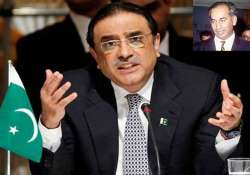Zardari Gives Assent For Review Of Bhutto's Death Sentence In SC
Islamabad, Apr 1: Pakistan President Asif Ali Zardari today gave his assent to a proposal to ask the Supreme Court to review the death sentence awarded to ex-premier Zulfikar Ali Bhutto in 1979, which the

Islamabad, Apr 1: Pakistan President Asif Ali Zardari today gave his assent to a proposal to ask the Supreme Court to review the death sentence awarded to ex-premier Zulfikar Ali Bhutto in 1979, which the ruling PPP contends led to the "judicial murder" of the leader.
Zardari signed the proposal in the presence of Law Minister Babar Awan and Sindh Home Minister Zulfikar Mirza, under Article 186 of the Constitution.
Presidential spokesman Farhatullah Babar said the proposal will now be sent to the Supreme Court by the Law Ministry.
Earlier this week, the federal Cabinet authorised the President to send a proposal on this subject to the Supreme Court.
Article 186 of Pakistan's Constitution states that the President can obtain the opinion of the apex court on any question of law he considers of public importance.
The Supreme Court will consider the matter and report its opinion to the President.
The move by Zardari -- who took over as PPP chief after his wife, former premier Benazir Bhutto, was assassinated in 2007 -- came three days ahead of the death anniversary of Zulfikar Ali Bhutto.
The PPP had "never intended to seek revenge but it wanted to put right a historic wrong and thereby vindicate the position" of Bhutto, the founding Chairman of the party, Babar said.
He recalled that a former judge who was part of the bench of the Supreme Court which upheld Bhutto's death sentence had publicly acknowledged that the split verdict was given under pressure from the dictatorship of the time.
The death sentence was awarded to Bhutto, Pakistan's first directly elected Prime Minister, by the Lahore High Court and subsequently upheld by the Supreme Court in March 1979 through a split verdict.
Bhutto was executed on April 4, 1979 by the then military dictatorship, which disregarded appeals by world leaders and serious reservations expressed by international jurists about the legal propriety of the death sentence.
The body of the Premier was secretly flown in the dead of the night to Larkana in southern Sindh and buried without permitting his family to attend the funeral and last rites.
The then military regime led by Zia-ul-Haq published pictures in newspapers of the funeral prayer to show that local residents had attended the burial.
On investigation, however, it was found that the few people shown in the picture were not local residents and had apparently been brought from outside, Babar said. PTI